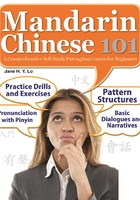
Practice Drills and Exercises
1. Do the substitution drills
(1) Nǐ zhōumò chángcháng zài jiā zuò shénme?
Wǒ chángcháng zài jiā kàn diànshì.

(2) Wǒ mèimei hěn xǐhuan tiào wŭ.

(3) Nǐ wèishénme xǐhuan xué Pŭtōnghuà?
Yīnwèi wǒ juéde xué Pŭtōnghuà hěn yǒu yìsi, suǒyǐ wǒ xǐhuan xué Pŭtōnghuà.

(4) Měitiān wǎnshang nǐ gēn shéi yīqǐ kàn diànshì?
Měitiān wǎnshang wǒ gēn Mǎlì yīqǐ kàn diànshì.

(5) Nǐ bù xǐhuan dà qiú, nàme wǒmen qù kàn shū ba.

2. Give a proper object to each of the following verbs and make sentences with them.
xuéxí kàn
dǎ tīng
jiào xǐhuan
3. Rearrange the following words and phrases to form them into sentences:
(1) Wǒ kàn hěn Měiguó xǐhuan diànyǐng tónghshì
.
(2) nǎr nǐ xuéxi zài Pŭtōnghuà
?
(3) gége jiā Mǎlì bù qù zhōumò
.
(4) wǎngqiú nǐ péngyou chángcháng ma dǎ
?
(5) xǐhuan yīnyuè měitiān tīng jiā wǎnshang mèimei zài
.
(6) juéde Zhāng lǜshī hěn yǒu yìsi Pŭtōnghuà xuéxí
.
4. Translate the following sentences:
(1) Sometimes I play basketball; sometimes I play volleyball.
(2) Mary studies Mandarin at home every evening.
(3) David often plays tennis with his colleagues.
(4) Because John is very busy, he will not go to see the movie.
(5) Mary does not like to play tennis. She only likes to sing, dance and listen to music.
(6) What do you often do at weekends?
(7) I like singing and dancing, but sometimes I also like reading.
(8) I think watching American movies is very interesting.
(9) Why don't you play basketball together with Mary?
Pǔtōnghuà Pīnyīn
A. Initials: zh, ch, sh, r
In Mandarin these sounds are retro flexed. The tongue tip and blade are curled upwards and touch the front part of the hard palate, allowing a narrow passage between the tongue-tip and the hard palate for the air to escape.

Pronouncable Initials

Notes
1 ‘-i’ only follows the consonants zh, ch, sh, r. It can be produced by first pronouncing ‘r’without moving the tongue and then keeping the sound there.
2 The finals that can be combined with zh, ch, sh, r are a, e, u and -i.
B. Nasal Finals : an, en, ang, eng, ong; ian, in, iang, ing, iong
an, en are front nasal consonants. They are pronounced by first producing the vowel ‘a’,‘e’ and then placing the tongue tip against the back of the upper teeth to force the air out through the nose.
ang, eng, ong are back nasal consonants. They are pronounced by drawing back the tongue and pressing its back against the soft palate as soon as the vowel is produced to release the air through the nose, like the ‘ng’ sound as found in the words ‘singer’ and‘tongue’.
ian, in, iang, ing and iong are all combinations of ‘i’ respectively with ‘an’,’en’ ‘eng’ ‘ang’‘ong’, but ‘ian’ and ‘in’ are front nasal finals. And iang, ing and iong are back nasal finals.
ian is pronounced as [i ε n]. It is similar to the English in yen.
in is pronounced as [in.]. It is similar to the English in mean.
iang is pronounced as [ia η]. It is similar to the English in Yonkers ing is pronounced as [i η]. It is similar to the English in sing,
iong is pronounced as [y η].
C. Nasal Finals

D. Rule of Romanization
The written forms of ‘ian’, ‘in’, ‘iang’, ‘ing’ and ‘iong’ become respectively ‘yan’, ‘yin’,‘yang’, ‘ying’ and ‘yong’ when each of them forms a syllable alone.